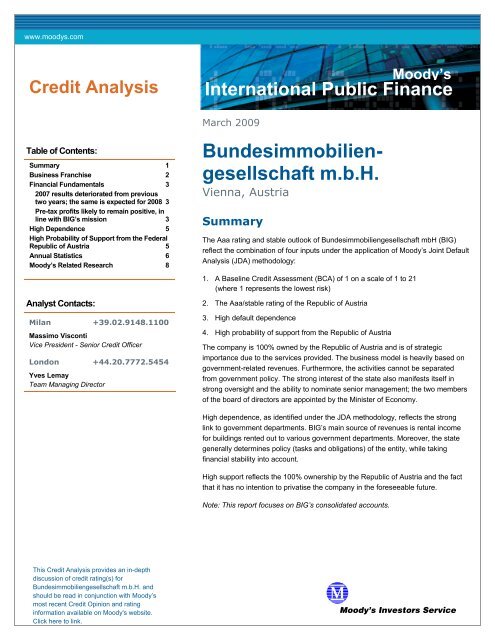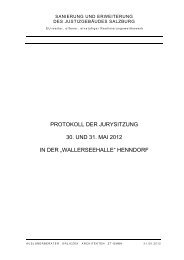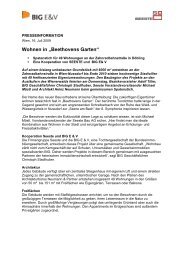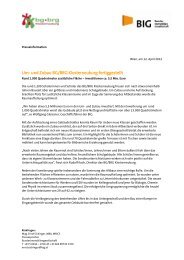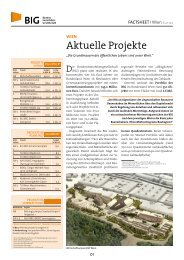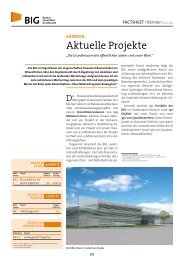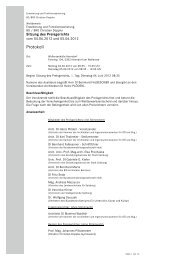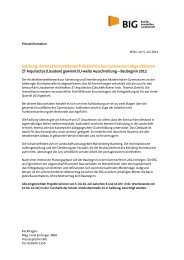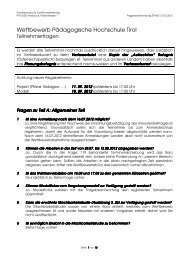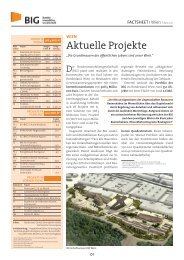International Public Finance Moody's Credit Analysis - BIG
International Public Finance Moody's Credit Analysis - BIG
International Public Finance Moody's Credit Analysis - BIG
You also want an ePaper? Increase the reach of your titles
YUMPU automatically turns print PDFs into web optimized ePapers that Google loves.
www.moodys.com<br />
<strong>Credit</strong> <strong>Analysis</strong><br />
Table of Contents:<br />
Summary 1<br />
Business Franchise 2<br />
Financial Fundamentals 3<br />
2007 results deteriorated from previous<br />
two years; the same is expected for 2008 3<br />
Pre-tax profits likely to remain positive, in<br />
line with <strong>BIG</strong>’s mission 3<br />
High Dependence 5<br />
High Probability of Support from the Federal<br />
Republic of Austria 5<br />
Annual Statistics 6<br />
Moody’s Related Research 8<br />
Analyst Contacts:<br />
Milan +39.02.9148.1100<br />
Massimo Visconti<br />
Vice President - Senior <strong>Credit</strong> Officer<br />
London +44.20.7772.5454<br />
Yves Lemay<br />
Team Managing Director<br />
This <strong>Credit</strong> <strong>Analysis</strong> provides an in-depth<br />
discussion of credit rating(s) for<br />
Bundesimmobiliengesellschaft m.b.H. and<br />
should be read in conjunction with Moody’s<br />
most recent <strong>Credit</strong> Opinion and rating<br />
information available on <strong>Moody's</strong> website.<br />
Click here to link.<br />
Moody’s<br />
<strong>International</strong> <strong>Public</strong> <strong>Finance</strong><br />
March 2009<br />
Bundesimmobiliengesellschaft<br />
m.b.H.<br />
Vienna, Austria<br />
Summary<br />
The Aaa rating and stable outlook of Bundesimmobiliengesellschaft mbH (<strong>BIG</strong>)<br />
reflect the combination of four inputs under the application of Moody’s Joint Default<br />
<strong>Analysis</strong> (JDA) methodology:<br />
1. A Baseline <strong>Credit</strong> Assessment (BCA) of 1 on a scale of 1 to 21<br />
(where 1 represents the lowest risk)<br />
2. The Aaa/stable rating of the Republic of Austria<br />
3. High default dependence<br />
4. High probability of support from the Republic of Austria<br />
The company is 100% owned by the Republic of Austria and is of strategic<br />
importance due to the services provided. The business model is heavily based on<br />
government-related revenues. Furthermore, the activities cannot be separated<br />
from government policy. The strong interest of the state also manifests itself in<br />
strong oversight and the ability to nominate senior management; the two members<br />
of the board of directors are appointed by the Minister of Economy.<br />
High dependence, as identified under the JDA methodology, reflects the strong<br />
link to government departments. <strong>BIG</strong>’s main source of revenues is rental income<br />
for buildings rented out to various government departments. Moreover, the state<br />
generally determines policy (tasks and obligations) of the entity, while taking<br />
financial stability into account.<br />
High support reflects the 100% ownership by the Republic of Austria and the fact<br />
that it has no intention to privatise the company in the foreseeable future.<br />
Note: This report focuses on <strong>BIG</strong>’s consolidated accounts.
<strong>Credit</strong> <strong>Analysis</strong> Moody’s <strong>International</strong> <strong>Public</strong> <strong>Finance</strong><br />
Bundesimmobiliengesellschaft m.b.H.<br />
Portfolio<br />
Management<br />
Business Franchise<br />
<strong>BIG</strong> was created by law in 1992 with the objective of centralising property management for Austria’s public<br />
sector, with a view to improving efficiency and, more specifically, the cost-efficiency of various government<br />
departments. The underlying premise was that requiring departments to pay for and account for their usage of<br />
buildings would force them to rationalise their use of space and allow surplus stock to be put to alternative use<br />
or sold.<br />
Following a revision of the act regulating <strong>BIG</strong>’s activities in 2000, the entity now owns the properties previously<br />
leased from the state. The purchase price was set at €2.4 billion, with the transfer completed during 2003. The<br />
purchase was financed with debt.<br />
Moody’s views €2.4 billion as a fair price for the transferred assets. According to an independent valuation of<br />
the properties by the Technische Universität Wien (Technical University of Vienna), the market value was €6.9<br />
billion. The lower transfer value takes into account the specialist nature of the properties – i.e. they possibly<br />
have a lower resale value – and future investment needs. Moreover, if <strong>BIG</strong> sells any of the transferred assets<br />
with a positive margin over the purchase price, it has to pay a share of the gain to the state, i.e. a formulaic<br />
calculation of the share, taking into account the gain on the disposal. The agreement with the state was<br />
revised as of 1 January 2005, allowing <strong>BIG</strong> to offset some costs prior to paying out around 80% of the gain.<br />
Figure 1:<br />
Organisation Chart<br />
Consumer<br />
Management<br />
Press<br />
Revision<br />
Org & Quality<br />
<strong>BIG</strong><br />
Bundesimmobiliengesellschaft m.b.H.<br />
Management Board<br />
Object<br />
Management<br />
Planning and<br />
Construction<br />
5 Teams 18 Teams 4 Regional<br />
Teams<br />
<strong>BIG</strong> has undertaken several initiatives toward continued rationalisation of its business model and internal<br />
procedures, seeking ever-higher efficiency and effectiveness in all its activities. The company took all<br />
necessary steps to ensure a successful transition to IFRS for the first time in 2007.<br />
2 March 2009 � <strong>Credit</strong> <strong>Analysis</strong> � Moody’s <strong>International</strong> <strong>Public</strong> <strong>Finance</strong> - Bundesimmobiliengesellschaft m.b.H.<br />
Facility<br />
Services<br />
CAD and<br />
Space<br />
Management
<strong>Credit</strong> <strong>Analysis</strong> Moody’s <strong>International</strong> <strong>Public</strong> <strong>Finance</strong><br />
Bundesimmobiliengesellschaft m.b.H.<br />
<strong>BIG</strong> has responsibility for managing the Austrian Republic’s real estate, with a portfolio largely dominated by<br />
schools and universities (70.5%) and other federal tenants such as prisons, police stations and court houses<br />
(27%) at year-end 2008. <strong>BIG</strong>’s activities involve renting out the buildings to the various government entities,<br />
carrying out renovations and new investments, and handling sales of redundant buildings and land. <strong>BIG</strong>’s<br />
holdings include a small residential property portfolio, mainly comprising the current and former homes of civil<br />
servants and other public sector employees (2%). <strong>BIG</strong> also offers facilities management services if required by<br />
the tenants.<br />
<strong>BIG</strong> consists of a holding company, Bundesimmobiliengesellschaft mbH (<strong>BIG</strong>), and – following the successful<br />
merger by incorporation of its subsidiary <strong>BIG</strong> Services, or IMB (Immobilienmanagementgesellschaft des<br />
Bundes) in 2006 – two main subsidiaries, <strong>BIG</strong> Finanzdienstleistungen GMBH and <strong>BIG</strong> Entwicklungs-Und<br />
Verwertungs GMBH, which are both 100% owned by <strong>BIG</strong> and consolidated into its accounts. The group also<br />
consolidates an array of companies related to particular buildings and projects.<br />
Around €2.1 billion will be spent in Austrian real estate between 2008 and 2010. Key priorities going forward<br />
continue to be the optimisation of key business, i.e. leasing of real estate to the federal Republic’s<br />
administration and project development with strategic partners.<br />
Financial Fundamentals<br />
2007 results deteriorated from previous two years; the same is<br />
expected for 2008<br />
The 2007 operating results, reported in line with the IFRS principles, were slightly down compared to 2006 (at<br />
€266.7 million vs. €268.7 million). Pre-tax profit was €114.5 million, down 28.3% compared to 2006, largely<br />
due to higher operating expenditures and depreciation. A drop in revenues from financial activities, namely<br />
interest proceeds and income from investments and from other securities, loans and advances, as well as<br />
minor taxes paid, further contributed to the reduction of financial surplus to €79.4 million in 2007, down by<br />
33.7% compared to 2006. This trend affecting the above-mentioned cost components is reported to have<br />
continued in 2008.<br />
Pre-tax profits likely to remain positive, in line with <strong>BIG</strong>’s<br />
mission<br />
Expectations going forward are in line with the business plan of the past 10 years, with pre-tax profits expected<br />
to remain positive, at around €50 million per year, given the expected higher growth of depreciation and<br />
financial expenditure; this is in line with <strong>BIG</strong>’s mission as the entity is not meant to be a profit maximiser. Some<br />
savings are expected from lower maintenance and service costs. On the other hand, growth in rental income is<br />
expected to be modest at around 3.2% a year over 2009-13, mainly thanks to the proposed second rental<br />
adjustment in 2011 under the five-year rent-adjustment mechanism. Other income – including that arising from<br />
service contracts and the disposal of properties – is expected to continue to represent around 12% of<br />
operating revenues in 2009-13.<br />
Rental Income and Occupancy<br />
Rental income is the mainstay of <strong>BIG</strong>’s income, representing a stable 79% of operating revenues in 2006-07.<br />
Of this, 98% comprises rents received from the state – i.e. from various ministries that use the buildings,<br />
although the universities now pay <strong>BIG</strong> directly from their government-allocated annual operating budgets. As<br />
such, the universities have become the direct payers, although the funds still stem from the Ministry of<br />
Education. Including such indirect payments, the Ministry for Education accounts for the majority (71%) of<br />
<strong>BIG</strong>’s rental income in the form of schools and universities, followed by other federal tenants (27%) and other<br />
tenants (2%). Rents are paid monthly or quarterly for all properties; all residential tenants pay rent on a<br />
monthly basis.<br />
In 2007, <strong>BIG</strong> sold properties worth €43.3 million, of which €23 million was paid to the Federal Republic as<br />
required by the agreement signed with the state.<br />
3 March 2009 � <strong>Credit</strong> <strong>Analysis</strong> � Moody’s <strong>International</strong> <strong>Public</strong> <strong>Finance</strong> - Bundesimmobiliengesellschaft m.b.H.
<strong>Credit</strong> <strong>Analysis</strong> Moody’s <strong>International</strong> <strong>Public</strong> <strong>Finance</strong><br />
Bundesimmobiliengesellschaft m.b.H.<br />
There are options for giving notice under the rental agreements; the notice period is one year for tenants,<br />
covering 70% of the total revenue. However, the tenants are deemed to be relatively stable, since the<br />
ministries need the properties as a base from which to provide services such as education. The notice periods<br />
for new projects or major renovations benefit from a clause that forbids the tenant from giving notice during the<br />
debt amortisation period (usually 20-25 years).<br />
Rental Levels Take Into Account a Reasonable Margin and the Need for<br />
Investment<br />
Rents have been fixed on a “market” basis, while taking into account the relatively specialised nature of the<br />
properties, and – as of 2003 – indexed to a designated consumer price index with a one-year time lag<br />
(currently CPI 1996). Adjustments are only permitted if they are 5% above this index, and the adjustment will<br />
then be in full. As such, the potential for rental increases is not considered to be particularly flexible. The first<br />
rental adjustment under this ruling was implemented in 2006, driving a corresponding increase in rental<br />
revenue following the small declines in 2004 that were a result of the gradual sell-off of non-core rental<br />
properties. The next adjustments, due to take place in 2011 and 2016, are expected to be slightly higher than<br />
the initial value of €22 million previously forecast.<br />
Increased Operating Costs as Planned<br />
<strong>BIG</strong>’s management successfully kept operating costs at an acceptable level through a focus on cost efficiency<br />
until 2006. In 2007 and 2008, higher personnel expenses, expenses related to materials, building and services<br />
and depreciation were responsible for the declining operating margins. Such declines were already forecast in<br />
the company’s business plan. Going forward, personnel expenses are expected to further grow in 2009-13 due<br />
to standard salary increases and one-off pension payments. The headcount, 788 in 2008 is expected to<br />
increase in 2009 to 825 and slightly diminish afterwards. Cost for materials, building and services are also<br />
expected to moderately increase in the period. The key reason for this is the anticipated investment versus<br />
initial planning as a part of <strong>BIG</strong>’s required contribution to the stimulus package (deficit spending policy)<br />
recently adopted by the Federal Government to sustain the national economy<br />
The other main cost item is interest expense, which is less flexible as it relates to the relatively “inflexible” debt<br />
stock accumulated to fund previous asset purchases and future investment needs. Financial expenses<br />
(including interest, expenses from financial assets and expenses from associated entities) were slightly up in<br />
2007 compared to 2006, but are reported to have dropped by 20% in 2008 following the company’s reduced<br />
investment activity and debt repayment. Expectations going forward are for a smaller annual increase until<br />
2013.<br />
Most of <strong>BIG</strong>’s investments are calculated for a period of 25 years, with a strong focus on sustainability, which<br />
translates into a strong focus on keeping maintenance costs at low and stable levels, averaging €183 million<br />
per year in 2009-2010 . This brings predictability to the financial plan in the long term.<br />
<strong>BIG</strong> invested €174 million on maintenance in 2008, the majority of which was spent on schools and<br />
universities (63%). <strong>BIG</strong> has also invested nearly €222 million in development projects and construction. At<br />
present, over 100 construction projects are being projected or undertaken, amongst which are two<br />
office/residential developments in Vienna, namely the Karree St Marx and the Eurogate development. Going<br />
forward, <strong>BIG</strong> expects annual construction investments (both construction projects and works) of more than 700<br />
million in 2009-10.<br />
Debt Set Up to Moderately Growth After 2 Year Break<br />
<strong>BIG</strong>’s stock of debt has grown rapidly since 2000 due to its purchase of properties from the central<br />
government; financial debt totalled €3.185 billion at the end of 2007, slightly less than in 2006. Net debt in<br />
2007 (new issuances minus maturities) was negative in 2007 and reportedly also in 2008.<br />
Based on its long-term budgets, <strong>BIG</strong>’s debt is not expected to grow considerably as the bulk of the assets from<br />
the state have now been purchased, although some minor purchases and some project investments are<br />
planned during the forecast period to 2010. Net debt is expected to grow at a moderate pace, with a total<br />
increase of close to €350 million (whereof €800 million in borrowings – 450 repayments) in 2009-10.<br />
4 March 2009 � <strong>Credit</strong> <strong>Analysis</strong> � Moody’s <strong>International</strong> <strong>Public</strong> <strong>Finance</strong> - Bundesimmobiliengesellschaft m.b.H.
<strong>Credit</strong> <strong>Analysis</strong> Moody’s <strong>International</strong> <strong>Public</strong> <strong>Finance</strong><br />
Bundesimmobiliengesellschaft m.b.H.<br />
By the end of 2008, 78% of the overall exposure was at fixed rates with almost all debt euro-denominated. The<br />
maturity profile shows one relevant peak, in 2013, but it is otherwise reasonably stable. Maturing issues tend<br />
to be refinanced and are generally well absorbed in the market as a consequence of the closeness of the<br />
issuer to the state. <strong>BIG</strong> has enjoyed the flight to quality phenomenon during the recent liquidity crunch,<br />
confirming investors’ preference for a solid issuer class. Interest rates and currency exposures are limited<br />
through the use of financial derivatives with high-quality counterparties (with ratings ranging from Aaa to Aa).<br />
Overall Adequate Liquidity Profile<br />
<strong>BIG</strong>’s cash flows are predictable, with 98% of the rental income (the mainstay of <strong>BIG</strong>’s income) coming from<br />
the state and paid quarterly. Cash outflows, mostly project financing and debt servicing, are also predictable.<br />
Mismatches are funded via <strong>BIG</strong>’s €1 billion Euro Commercial Paper Programme (rated P-1). The programme<br />
was not used in 2008 given <strong>BIG</strong>’s abundant liquidity. Additionally, <strong>BIG</strong> can still use short-term drawing rights<br />
with banks. No back-up facilities are in place, although the predictable nature of <strong>BIG</strong>’s cash flows and its<br />
closeness to the Austrian government are mitigating factors.<br />
High Dependence<br />
The high dependence between <strong>BIG</strong> and the Federal Republic of Austria is due to the almost total reliance of<br />
its revenue structure on rental income from Austrian public institutions.<br />
High Probability of Support from the Federal Republic<br />
of Austria<br />
The 100% ownership of <strong>BIG</strong> by the Republic of Austria provides comfort that the owner will:<br />
� Support the entity in the event of a problem arising.<br />
� Remain the main tenant of <strong>BIG</strong>, and hence provide revenue/margin stability.<br />
� Determine policy (tasks and obligations) of the entity going forward, while taking financial stability into<br />
account.<br />
� Supervise and control the activities of <strong>BIG</strong>.<br />
The state’s ownership could only be reduced below 100% through a change in the law pertaining to <strong>BIG</strong>.<br />
Although this is not impossible, to date the government has not signalled any intention to effect such a change,<br />
as <strong>BIG</strong> is regarded as a vital instrument in the management of the state’s properties. <strong>BIG</strong>’s accounts are<br />
audited by the Federal Audit Office.<br />
Furthermore, there are no plans to extend the entity’s activities to the private sector to a material degree.<br />
Although the law permits <strong>BIG</strong> to carry out commercial property marketing and development, such activities are<br />
supposed to be of a subsidiary nature and there are currently no plans to expand commercial activities beyond<br />
asset sales of surplus or unused properties and land. In fact, <strong>BIG</strong>’s new management reiterated that activities<br />
will remain focused on the state, either in terms of new projects or further state asset purchases. Only a few<br />
activities will involve the development of projects for third parties. In this regard, <strong>BIG</strong> envisages more projects<br />
that link state activity/policy with the private sector, like the ICT technology park in Tyrol where the university<br />
will share a building with private enterprises.<br />
5 March 2009 � <strong>Credit</strong> <strong>Analysis</strong> � Moody’s <strong>International</strong> <strong>Public</strong> <strong>Finance</strong> - Bundesimmobiliengesellschaft m.b.H.
<strong>Credit</strong> <strong>Analysis</strong> Moody’s <strong>International</strong> <strong>Public</strong> <strong>Finance</strong><br />
Bundesimmobiliengesellschaft m.b.H.<br />
Annual Statistics<br />
Bundesimmobilien-gesellschaft m.b.H.<br />
6 March 2009 � <strong>Credit</strong> <strong>Analysis</strong> � Moody’s <strong>International</strong> <strong>Public</strong> <strong>Finance</strong> - Bundesimmobiliengesellschaft m.b.H.<br />
2006 2007<br />
Total Financial Debt (Fair Value IAS 39 - TEUR) 3,201,248.0 3,185,409.8<br />
Debt due within one year 453,884 492,016<br />
Debt due after one year 2,747,364 2,693,394<br />
Profit and Loss (Consolidated - TEUR)<br />
Income from rental of investment property 596,853 620,956<br />
Income from services 110,971 114,188<br />
Proceeds from disposal of investment and inventory property 46,814 43,373<br />
Other operating income 588 3,726<br />
Operating Revenues (EUR 000's) 755,226 782,244<br />
79.0% 79.4%<br />
Operating expenditures for realization of rental income -335,705 -365,127<br />
Costs from services -86,562 -97,254<br />
Operating expenditures for disposal of investment property -48,309 -31,463<br />
Book Value of sold inventory property -1,250 -4,512<br />
Other -14,687 -17,169<br />
Operating Costs -486,514 -515,525<br />
Operating Profit 268,713 266,719<br />
Results from associated companies -381 -1,047<br />
Financing income 84,347 48,738<br />
Financing expenses -192,898 -199,911<br />
Financial Results -108,552 -151,172<br />
Pre-tax Profits 159,780 114,500<br />
Income Tax -40,084 -35,109<br />
Consolidated Results 119,696 79,391
<strong>Credit</strong> <strong>Analysis</strong> Moody’s <strong>International</strong> <strong>Public</strong> <strong>Finance</strong><br />
Bundesimmobiliengesellschaft m.b.H.<br />
Bundesimmobilien-gesellschaft m.b.H.<br />
Balance Sheet (TEUR)<br />
Assets:<br />
7 March 2009 � <strong>Credit</strong> <strong>Analysis</strong> � Moody’s <strong>International</strong> <strong>Public</strong> <strong>Finance</strong> - Bundesimmobiliengesellschaft m.b.H.<br />
2006 2007<br />
Investment property rented out 3,436,544 3,660,956<br />
Investment property in the development stage 745,221 458,850<br />
Taqngible assets 10,640 22,855<br />
Intangible assets 8,098 7,146<br />
Shares in associated companies 10,864 12,407<br />
Other financial assets 37,846 39,037<br />
Active deferred taxes 17,773 32,863<br />
Long term assets 4,266,986 4,234,114<br />
Inventory 13,965 17,959<br />
Receivables for effective profit tax 22,327 8,422<br />
Receivables and other assets 71,244 64,476<br />
Liquid funds 3,871 74,688<br />
Short term Assets 111,406 165,545<br />
Total assets 4,378,392 4,399,659<br />
Liabilities:<br />
Nominal capital 226,000 226,000<br />
Revenue reserves 486,790 566,131<br />
Equity 712,790 792,131<br />
Financial liabilities 2,747,364 2,693,394<br />
Provisions for personnel 7,961 8,259<br />
Other provisions 5,000 5,000<br />
Investment grants from public funds 42,299 58,609<br />
Trade payables 1,518 2,178<br />
Other liabilities 121,164 76,188<br />
Indirect deferred taxes 0 0<br />
long-term liabilities 2,925,305 2,843,629<br />
Financial liabilities 453,884 492,016<br />
Provision for effective income tax 0 0<br />
Trade payables 123,464 116,939<br />
Other liabilities 162,950 154,944<br />
Short-term liabilities 740,297 763,899<br />
4,378,392 4,399,659
<strong>Credit</strong> <strong>Analysis</strong> Moody’s <strong>International</strong> <strong>Public</strong> <strong>Finance</strong><br />
Bundesimmobiliengesellschaft m.b.H.<br />
Moody’s Related Research<br />
<strong>Analysis</strong>:<br />
� Austria, November 2008 (112339)<br />
Rating Methodologies:<br />
� The Application of Joint Default <strong>Analysis</strong> to Government Related Issuers, April 2005 (92432)<br />
� The Application of Joint Default <strong>Analysis</strong> to Government Related Issuers, April 2005 - German version<br />
(92806)<br />
To access any of these reports, click on the entry above. Note that these references are current as of the date of publication<br />
of this report and that more recent reports may be available. All research may not be available to all clients.<br />
8 March 2009 � <strong>Credit</strong> <strong>Analysis</strong> � Moody’s <strong>International</strong> <strong>Public</strong> <strong>Finance</strong> - Bundesimmobiliengesellschaft m.b.H.
<strong>Credit</strong> <strong>Analysis</strong> Moody’s <strong>International</strong> <strong>Public</strong> <strong>Finance</strong><br />
Bundesimmobiliengesellschaft m.b.H.<br />
Report Number: 115199<br />
Author Editor Senior Production Associate<br />
Massimo Visconti Suzy Bibko Kerstin Thoma<br />
CREDIT RATINGS ARE MOODY'S INVESTORS SERVICE, INC.'S (MIS) CURRENT OPINIONS OF THE RELATIVE FUTURE CREDIT RISK OF ENTITIES, CREDIT<br />
COMMITMENTS, OR DEBT OR DEBT-LIKE SECURITIES. MIS DEFINES CREDIT RISK AS THE RISK THAT AN ENTITY MAY NOT MEET ITS CONTRACTUAL,<br />
FINANCIAL OBLIGATIONS AS THEY COME DUE AND ANY ESTIMATED FINANCIAL LOSS IN THE EVENT OF DEFAULT. CREDIT RATINGS DO NOT ADDRESS<br />
ANY OTHER RISK, INCLUDING BUT NOT LIMITED TO: LIQUIDITY RISK, MARKET VALUE RISK, OR PRICE VOLATILITY. CREDIT RATINGS ARE NOT<br />
STATEMENTS OF CURRENT OR HISTORICAL FACT. CREDIT RATINGS DO NOT CONSTITUTE INVESTMENT OR FINANCIAL ADVICE, AND CREDIT RATINGS<br />
ARE NOT RECOMMENDATIONS TO PURCHASE, SELL, OR HOLD PARTICULAR SECURITIES. CREDIT RATINGS DO NOT COMMENT ON THE SUITABILITY OF<br />
AN INVESTMENT FOR ANY PARTICULAR INVESTOR. MIS ISSUES ITS CREDIT RATINGS WITH THE EXPECTATION AND UNDERSTANDING THAT EACH<br />
INVESTOR WILL MAKE ITS OWN STUDY AND EVALUATION OF EACH SECURITY THAT IS UNDER CONSIDERATION FOR PURCHASE, HOLDING, OR SALE.<br />
© Copyright 2009, Moody’s Investors Service, Inc., and/or its licensors and affiliates (together, "MOODY'S”). All rights reserved. ALL INFORMATION CONTAINED<br />
HEREIN IS PROTECTED BY COPYRIGHT LAW AND NONE OF SUCH INFORMATION MAY BE COPIED OR OTHERWISE REPRODUCED, REPACKAGED,<br />
FURTHER TRANSMITTED, TRANSFERRED, DISSEMINATED, REDISTRIBUTED OR RESOLD, OR STORED FOR SUBSEQUENT USE FOR ANY SUCH<br />
PURPOSE, IN WHOLE OR IN PART, IN ANY FORM OR MANNER OR BY ANY MEANS WHATSOEVER, BY ANY PERSON WITHOUT MOODY’S PRIOR<br />
WRITTEN CONSENT. All information contained herein is obtained by MOODY’S from sources believed by it to be accurate and reliable. Because of the possibility of<br />
human or mechanical error as well as other factors, however, such information is provided “as is” without warranty of any kind and MOODY’S, in particular, makes<br />
no representation or warranty, express or implied, as to the accuracy, timeliness, completeness, merchantability or fitness for any particular purpose of any such<br />
information. Under no circumstances shall MOODY’S have any liability to any person or entity for (a) any loss or damage in whole or in part caused by, resulting<br />
from, or relating to, any error (negligent or otherwise) or other circumstance or contingency within or outside the control of MOODY’S or any of its directors, officers,<br />
employees or agents in connection with the procurement, collection, compilation, analysis, interpretation, communication, publication or delivery of any such<br />
information, or (b) any direct, indirect, special, consequential, compensatory or incidental damages whatsoever (including without limitation, lost profits), even if<br />
MOODY’S is advised in advance of the possibility of such damages, resulting from the use of or inability to use, any such information. The credit ratings and financial<br />
reporting analysis observations, if any, constituting part of the information contained herein are, and must be construed solely as, statements of opinion and not<br />
statements of fact or recommendations to purchase, sell or hold any securities. NO WARRANTY, EXPRESS OR IMPLIED, AS TO THE ACCURACY, TIMELINESS,<br />
COMPLETENESS, MERCHANTABILITY OR FITNESS FOR ANY PARTICULAR PURPOSE OF ANY SUCH RATING OR OTHER OPINION OR INFORMATION<br />
IS GIVEN OR MADE BY MOODY’S IN ANY FORM OR MANNER WHATSOEVER. Each rating or other opinion must be weighed solely as one factor in any<br />
investment decision made by or on behalf of any user of the information contained herein, and each such user must accordingly make its own study and evaluation<br />
of each security and of each issuer and guarantor of, and each provider of credit support for, each security that it may consider purchasing, holding or selling.<br />
MOODY’S hereby discloses that most issuers of debt securities (including corporate and municipal bonds, debentures, notes and commercial paper) and preferred<br />
stock rated by MOODY’S have, prior to assignment of any rating, agreed to pay to MOODY’S for appraisal and rating services rendered by it fees ranging from<br />
$1,500 to approximately $2,400,000. Moody’s Corporation (MCO) and its wholly-owned credit rating agency subsidiary, Moody’s Investors Service (MIS), also<br />
maintain policies and procedures to address the independence of MIS’s ratings and rating processes. Information regarding certain affiliations that may exist<br />
between directors of MCO and rated entities, and between entities who hold ratings from MIS and have also publicly reported to the SEC an ownership interest in<br />
MCO of more than 5%, is posted annually on Moody’s website at www.moodys.com under the heading “Shareholder Relations — Corporate Governance — Director<br />
and Shareholder Affiliation Policy.”<br />
9 March 2009 � <strong>Credit</strong> <strong>Analysis</strong> � Moody’s <strong>International</strong> <strong>Public</strong> <strong>Finance</strong> - Bundesimmobiliengesellschaft m.b.H.


